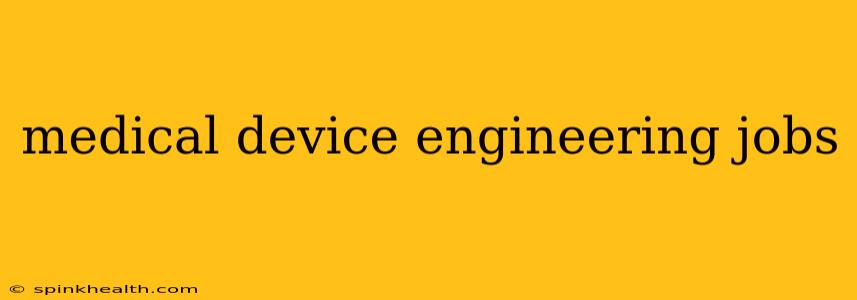Charting a Course in Medical Device Engineering: A Journey into Innovation and Impact
The world of medical device engineering isn't just about building gadgets; it's about crafting tools that improve and even save lives. It's a field brimming with challenges, innovation, and the deeply satisfying feeling of making a tangible difference. If you're considering a career in this dynamic sector, this guide navigates the landscape, exploring various job roles, career paths, and the skills needed to thrive.
Imagine this: you’re part of a team designing a revolutionary prosthetic limb, a life-saving diagnostic tool, or a minimally invasive surgical instrument. That's the reality for medical device engineers every day. It's a field that blends engineering principles with a deep understanding of the human body and the healthcare industry.
What Does a Medical Device Engineer Do?
The daily tasks of a medical device engineer vary widely depending on their specialization and the stage of a product's lifecycle. However, some common activities include:
- Design and Development: This involves conceptualizing new devices, creating prototypes, and conducting rigorous testing to ensure safety and effectiveness.
- Testing and Validation: Medical devices undergo extensive testing to meet stringent regulatory requirements. Engineers play a vital role in this process, ensuring compliance with standards like FDA regulations.
- Manufacturing and Production: Once a device is approved, engineers work to optimize the manufacturing process for efficiency, quality control, and cost-effectiveness.
- Research and Development: This focuses on exploring new technologies and materials to improve existing devices and develop innovative solutions for unmet medical needs.
- Regulatory Affairs: Navigating the complex regulatory landscape is crucial. Engineers often collaborate with regulatory specialists to ensure compliance.
What Types of Medical Device Engineering Jobs Are There?
The field is diverse, offering a range of specializations and career paths. Here are a few examples:
- Biomedical Engineer: This broad category encompasses many roles, focusing on the application of engineering principles to biological and medical systems.
- Software Engineer (Medical Devices): These engineers develop the software that controls and monitors medical devices, demanding expertise in embedded systems and regulatory compliance.
- Mechanical Engineer (Medical Devices): They focus on the mechanical design and functionality of devices, ensuring proper operation and safety.
- Electrical Engineer (Medical Devices): Their expertise lies in the electrical systems within devices, focusing on power management, circuitry, and signal processing.
- Quality Assurance Engineer (Medical Devices): Crucial for ensuring product quality and regulatory compliance throughout the entire lifecycle of a device.
What Skills Are Essential for Medical Device Engineering Jobs?
Beyond a strong foundation in engineering principles, several key skills are highly valuable:
- Technical Proficiency: A deep understanding of engineering principles relevant to the specific specialization.
- Problem-Solving Skills: The ability to identify and solve complex engineering challenges creatively and efficiently.
- Regulatory Knowledge: Familiarity with FDA regulations and other relevant standards is essential.
- Teamwork and Collaboration: Medical device development is a collaborative effort requiring seamless interaction within multidisciplinary teams.
- Communication Skills: Clearly communicating technical information to both technical and non-technical audiences is crucial.
What Education and Experience are Needed?
A bachelor's degree in biomedical engineering, mechanical engineering, electrical engineering, or a related field is typically the minimum requirement. Advanced degrees (Master's or PhD) are often preferred for research and development roles. Relevant internship experience significantly enhances job prospects.
How Much Do Medical Device Engineering Jobs Pay?
Salaries vary significantly depending on experience, location, specialization, and company size. However, medical device engineering is a well-compensated field, often offering competitive salaries and benefits packages.
What are the career paths in Medical Device Engineering?
The career progression in medical device engineering can be rewarding and varied. Entry-level positions often lead to roles with increased responsibility and specialization. With experience, engineers may advance to senior engineering positions, project management roles, or even leadership positions within the company.
What is the job outlook for Medical Device Engineering Jobs?
The job outlook for medical device engineers is generally positive, driven by ongoing technological advancements, an aging population, and increasing demand for sophisticated medical technologies.
This journey into the world of medical device engineering only scratches the surface. It’s a field where your skills and dedication can translate into tangible improvements in healthcare, making it a deeply rewarding and impactful career path.

